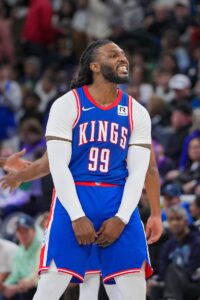As we explained when we identified the players who will become trade-eligible on unique dates this season, there’s a small group of players whose trade restrictions won’t lift until sometime after the February 6 trade deadline. These players meet one of the following criteria:
- They signed a free agent contract or were promoted from a two-way contract after November 6.
- A player who signs a free agent contract or is promoted from a two-way contract is ineligible to be traded for at least three months.
- They signed a veteran contract extension (meeting certain criteria) after August 6.
- A player who signs a veteran extension that keeps him under contract for more than four total years (including his current contract), includes a first-year raise greater than 20%, includes a subsequent raise exceeding 5%, or includes a renegotiation is ineligible to be traded for six months.
- They signed a super-max contract.
- A player who signs a super-max contract (also known as a designated veteran contract) is ineligible to be traded for one year.
We identified all the players who fell into these three categories in our previous story on unique trade dates, but they may have slipped through the cracks amid the larger list of players we discussed in that article.
With that in mind, we want to specifically single them out today to make sure it’s clear which players won’t become trade-eligible at all until sometime after the 2024/25 regular season.
Here are the players who fall into the three aforementioned groups and who can’t be traded this season:
Players who have signed standard contracts since November 6:
 Branden Carlson (Thunder)
Branden Carlson (Thunder)- Jae Crowder (Kings)
- Keshad Johnson (Heat)
- Paul Reed (Pistons)
- Landry Shamet (Knicks)
There hasn’t been a ton of action on the free agent market since the regular season began, with most players who have signed with NBA teams receiving two-way contracts rather than standard deals.
Still, the Thunder and Kings added 15th men on non-guaranteed contracts; the Heat promoted Johnson from his two-way deal; and the Knicks and Pistons re-signed veterans whom they waived earlier in 2024/25.
All of those players are ineligible to be moved this season, and this list will continue to grow if more free agents sign standard contracts between now and February 6.
Players who have signed veteran contract extensions meeting certain criteria since August 6:
- Wendell Carter Jr. (Magic)
- Alex Caruso (Thunder)
- Joel Embiid (Sixers)
- Aaron Gordon (Nuggets)
- Lauri Markkanen (Jazz)
- T.J. McConnell (Pacers)
- Jamal Murray (Nuggets)
- Ivica Zubac (Clippers)
A few players on this list wouldn’t have been trade candidates regardless of whether or not they signed extensions in recent months. Others, including Carter and Markkanen, had been the subject of offseason trade speculation. Now all of them are ineligible to be dealt until the 2025 offseason.
It’s not uncommon for some players who are eligible for in-season veteran extensions to sign new deals well into the season, as Caruso did last week, so it’s certainly possible more names will be added to this group before February’s trade deadline.
Players who have signed super-max contracts:
- Jayson Tatum (Celtics)
Tatum signed his designated veteran extension on July 6, 2024, which means he won’t become trade-eligible until July 6, 2025.
No other players will join the Celtics forward on this list prior to next month’s trade deadline, since super-max deals can’t be signed during the season.
Note: This article refers to players on standard contracts. Players on two-way contracts can’t be traded for 30 days after signing, meaning any player who signs a two-way deal after January 7 this season will be ineligible to be dealt by the deadline.
What about Moses Moody?
He’s one of 11 players who are affected by the poison pill provision. Those 11 will be difficult to trade because their incoming and outgoing salary-matching figures will be different, but any of them could legally be moved before the deadline.